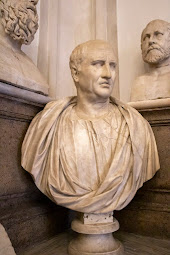The brutal beheading of a great Roman politician and orator
 |
| A late 19th century book illustration showing the imagined scene of the murder of Cicero |
Marcus Tullius Cicero had been a lawyer, philosopher and orator who had written extensively during the turbulent political times that led to the establishment of the Roman Empire.
In the months following Julius Caesar's assassination in 44BC, Cicero had delivered several speeches urging the Roman Senate to support Octavian, Caesar’s adopted son, in his struggle against Mark Antony.
Cicero attacked Antony in a series of powerful addresses and urged the Roman senate to name Antony as an enemy of the state. Antony responded by issuing an order for Cicero to be hunted down and killed.
He was the most doggedly pursued of all the enemies of Antony whose deaths had been ordered. Cicero was finally caught on 7 December 43BC leaving his villa in Formia in a litter - a kind of Sedan chair - heading to the seaside.
 |
| The portrait bust of Cicero at Rome's Capitoline Museum |
He leaned his head out of the litter and bowed to his captors who cut off his head. On Antony’s instructions, Cicero’s hands, which had written so much against Antony, were cut off as well and they were later nailed along with his head on the Rostra in the Forum Romanum.
Cicero has gone down in history as one of Rome’s greatest orators and writers. He also had immense influence on the development of the Latin language.
Born in 106BC into a wealthy family in what is now Arpino in Lazio, Cicero served briefly in the military before turning to a career in law, where he developed a reputation as a formidable advocate.
As a politician, he went on to be elected to each of Rome’s principal offices, in 63BC becoming the youngest citizen to attain the highest rank of consul without coming from a political family.
He is perceived to have been one of the most versatile minds of ancient Rome, introducing Romans to Greek philosophy and distinguishing himself as a linguist, translator, and philosopher.
 |
| A fresco showing Cicero denouncing Catiline in a speech to the Roman senate |
Nonetheless, he is remembered as a staunch defender in his speeches and writings of the Roman Republic and its values, which he believed was the best form of government and worth defending at all costs. He was a strong advocate of the rule of law, which he felt was essential for maintaining a stable and just society.
One of his great successes was to expose a plot by the senator Catiline to overthrow the Roman Republic and establish himself as dictator. He convinced the Senate to take action against Catiline, and the plot was foiled.
.png) |
| The Cisternone Romano is one of Formia's attractions |
The Formia of today is a bustling coastal town on the coast of Lazio, about 150km (93 miles) south of Rome and roughly 90km (56 miles) north of Naples. During the age of the Roman Empire it was a popular resort, renowned for a favourable climate, and many other prominent Romans had villas there in addition to Cicero. His burial place - the Tomba di Cicerone, a Roman mausoleum just outside the town - remains a tourist destination. The city was also the scene of the martyrdom of Saint Erasmus during the persecutions of Diocletian. Heavily damaged during World War Two, the town was rebuilt and now serves as a commercial centre for the region. Tourists tend to favour the picturesque resort of Gaeta, which sits at the head of a promontory a few kilometres away, but Formia has pleasant beaches of its own and plenty of shops and restaurants. The Cisternone Romano, an enormous underground reservoir in which the Romans collected water to supply the area, is another visitor attraction.
 |
| The dramatic hilltop setting of Arpino, the town in Lazio that was Cicero's birthplace |
Arpino, the birthplace of Cicero, is a charming hilltop town situated some 130km (81 miles) southeast of Rome often overlooked by tourists despite its mix of Roman ruins, narrow mediaeval streets and picturesque squares. Attractions include the church of Santa Maria di Civita, perched on top of a rocky hill offering breathtaking views of the surrounding countryside, and the Arpino Museum, in the Palazzo del Popolo, which has a collection of archaeological artefacts and mediaeval art. Arpino has a tradition of simple but delicious food, such as porchetta (roast pork stuffed with herbs) and pecorino cheese, a hard cheese matured for many months that is the area’s equivalent of parmigiano. Outside Arpino, in the Liri valley, a little north of the Isola del Liri, lies the church of San. Domenico, which marks the site of the villa in which Cicero was born.
Also on this day:
1302: The birth of Azzone Visconti, ruler of Milan
1598: The birth of architect and sculptor Gian Lorenzo Bernini
1643: The birth of engraver and printmaker Giovanni Battista Falda
Feast of St Ambrose, patron saint of Milan


